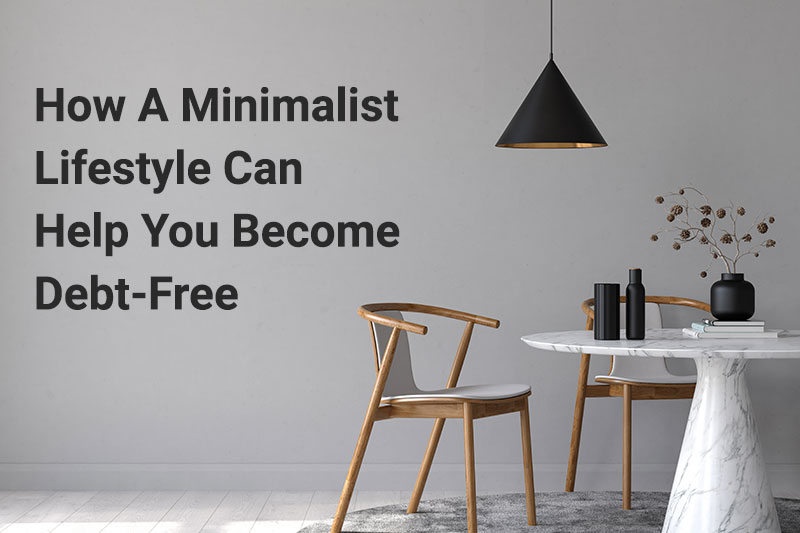A life without debt is something we universally desire. But in an economy ruled by credit and spending, is debt-free living even possible?
Arguably, for minimalists, it is more than possible: It is a way of life.
In the minimalist lifestyle, not only is it possible to become debt-free (the best debt relief options out there almost always involve adopting a minimalistic, modest lifestyle) – it is a byproduct of the practice. Here, we examine the minimalist lifestyle and consider how you can become debt-free by adopting practices of the lifestyle.
What is minimalism?
In short, a minimalist lifestyle means living with less. Said differently, it is a way of sorting your priorities to avoid the endless acquisition of material items: Rather than relying on credit cards and loans to purchase the material things desired, a minimalist lifestyle is about your needs rather than your desires or your wants. It allows you to focus on what is important, eliminate unnecessary expenses, and help you become completely free from debt.
A few features of minimalism include:
- Limited possessions
- Simple housing
- Obtaining only the items that are absolutely essential
- Resistance to acquiring material objects for their own sake
Adopting this way of life requires shifting your focus to constantly re-evaluate how you distinguish between needs and wants. A minimalist lifestyle allows you to live without clutter and eliminate distractions, reduce stress, and focus your energy on what is truly important.
How can a minimalist lifestyle get me out of debt?
By adopting a minimalist lifestyle, or at least some minimalist habits, you can save money, reduce expenses, and have more money available to pay down outstanding debt. Minimalists only purchase what they need, eliminating impulse buys or frivolous spending. Minimalism forces you to prioritize your spending.
In practicing minimalism, you will not buy things in the same way. Rather than wondering if you have the money to buy something you want, your spending habits will be about necessity. This new way of thinking will reduce the likelihood of incurring future debt. You will spend less and save more, giving you the money to purchase what you need when you need it – without having to rely on credit. Not to mention, by eliminating things you do not need, you will inevitably save money. Sure, you need electricity, but do you really need the highest cable package, super high-speed internet, and a premium music and video streaming account? Cutting back to the essentials will lower or eliminate your bills giving you less to keep up with.
Minimalists often use cash for all expenses. This is another way a minimalist lifestyle helps with saving money. Cash is harder to spend because it is tangible. When we use cash for a purchase, we see the money exchanging hands as we part with it. This is an effective tool to help with spending less.
So, a minimalist lifestyle puts more money in your pocket. You have fewer bills, lower monthly expenses, and less stuff to maintain. With all that money you are no longer spending on non-essentials, you can make bigger payments toward your outstanding debt. Instead of paying the minimum amount on your credit card bill and refinancing your loans, you will have the money to make much higher payments which will reduce your debt faster and ultimately get you out of debt.
What steps should I take to try out minimalism?
- Identify what you need and get rid of what you don’t. Starting small is a good way to avoid feeling overwhelmed or restricted. Survey your home and box up all the duplicates. If you have more than one of the same thing, pick one to keep and toss the others into the box.
- Downsize your closet. A good rule of thumb is if you have not worn a piece of clothing in one year, toss it.
- Have a garage sale. Parting with the items you decide you do not need is an effective way to reduce the excess in your life while putting money in your pocket to pay down debt or save for later.
- Adjust to life with less. Once you have purged the excess in your home, spend some time adjusting to life with less. Consider what else you can live without. For instance, perhaps you can eliminate your car payment by purchasing an older model vehicle. Or maybe you live in a town with a great public transportation system and decide you no longer need a vehicle saving you gas money, maintenance expenses, and insurance costs.
A minimalist lifestyle can be a dramatic change. You do not have to jump in headfirst to reap the benefits of this practice. Whether you adhere to strict minimalist guidelines or loosely embrace a less-is-more ideal, a minimalist lifestyle can make a huge impact on your financial and emotional health. By cutting back a little bit at a time, you give yourself time to adjust and fully embrace this new mindset.


